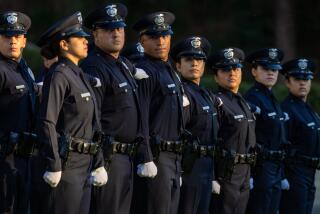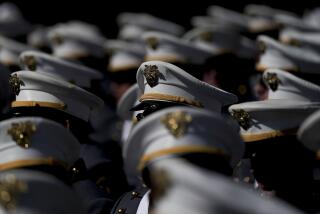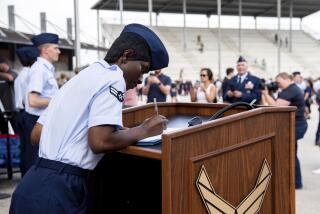Military Strategy : Foreign Cadets Are Exposed to American Ideals at West Point
- Share via
WEST POINT, N.Y. — The United States Military Academy is legendary for producing such all-American war heroes as Ulysses S. Grant, Douglas MacArthur and Dwight D. Eisenhower. But the “country” in West Point’s motto “Duty, Honor, Country” does not necessarily mean the United States.
For the last century, West Point has also been a training ground for future generals of foreign armies--dictatorships as well as democracies.
Soldiers such as Filipino Gen. Fidel V. Ramos, the late Nicaraguan dictator Anastasio D. Somoza and pre-revolutionary Chinese Army Gen. Ying Hsing Wen marched out of West Point’s storied Long Gray Line to play key historical roles.
30 Foreign Cadets
This year’s foreign plebes come from Bolivia, Guatemala, Lebanon, Liberia, Malaysia, the Philippines, Malawi, Singapore, Jordan, Turkey and Zimbabwe. Currently, 30 foreign cadets are training at West Point from Bangladesh, Haiti, Senegal, Cameroon, Liberia and Botswana, among other places.
Once approved by the secretary of defense, a nation’s politics or relations with the United States are not considered in judging an applicant’s merits, says Capt. Robin Carrington, admissions officer for foreign cadets.
“We do not deal with philosophy,” Carrington said. “We try to keep standards for foreign cadets exactly the same as U.S. citizens.”
There are cadets from countries ruled by hard-line dictators who do not tolerate dissent or hold elections, as well as from countries with democratic governments like that of the United States.
The purpose of educating foreign cadets at West Point, according to a congressional report, is to build good will and expose future foreign military leaders to American ideals, especially in developing nations where the United States seeks to promote stability.
Similar Programs
Annapolis and the Air Force Academy have similar programs. By law, each military academy is allowed 40 foreign cadets at a time. At the moment, the Air Force academy has 37 and the naval academy 32.
“Our goal is to provide an opportunity for students from selected countries to attend the Air Force Academy and learn more about the way we do business in this country and go back home with a first-rate military education and hopefully be better allies,” said Lt. Col. John Swiney, associate director of admissions at the U.S. Air Force Academy.
Fidel Ramos graduated from West Point with honors in 1950. Thirty-six years later, he played a pivotal role in the revolt that ended Ferdinand E. Marcos’ 20-year reign in the Philippines and put Corazon Aquino in power.
Ramos developed friendships with West Point classmates who went on to powerful posts in the U.S. military, including Charles Gabriel, an Air Force chief of staff, and John Wickham, who became the U.S. Army’s chief of staff.
Ramos is now Philippine defense secretary and one of his country’s most popular figures. A veteran of the Korean and Vietnam wars, Ramos is using his education to fight a communist insurgency and quell coups in the Philippines.
Benefits for Countries
Natee Wongissares, a senior from Bangkok, Thailand, agrees that both countries have benefited from Thailand’s cadets at West Point.
“In the future these people (West Point graduates) have a tendency toward the United States,” the Thai cadet said. “They can affect the relationship between the two countries for a better relationship, they will work together.”
Unstable political climates in some Third World countries, where change is more apt to take the form of a coup than a democratic vote, have created unusual situations for West Point graduates.
Capt. Moises Cortizo, Class of 1980, is a loyal aide to Panamanian strongman Manuel A. Noriega, at odds with the United States since his indictment by an American grand jury on drug trafficking charges last year.
Ricardo Ernesto Castro, Class of 1973, sought political asylum in the United States after testifying before Congress about his activities as a leader of a Salvadoran death squad.
Somoza a Graduate
Anastasio D. Somoza, son of the Nicaraguan dictator Anastasio Somoza, was given command of the Nicaraguan national guard when he graduated from West Point in 1946. He went on to succeed his father as president before the Sandinista revolution ended that regime.
West Point’s first foreign cadets came from South America, but the program has expanded virtually worldwide. Countries with cadets at West Point are no longer necessarily U.S. allies.
Soviet cadets may enter West Point classrooms next fall under a program approved by the Ronald Reagan Administration allowing West Point and Soviet military academies to exchange cadets for two-week visits.
American cadets also have the opportunity to spend two weeks at a foreign military academy in one of more than 30 countries including Venezuela, Jordan, Belgium, Morocco, the Dominican Republic and Japan.
Of more than 70 nations invited, 25 to 30 send applications. Many of America’s strongest allies do not send cadets to West Point. NATO member countries are invited but don’t participate, although a Canadian midshipman is attending the naval academy.
Designated Spaces
Foreign cadets don’t compete against American candidates, says academy spokeswoman Andrea Hamburger. “These spaces are specifically designated for non-American cadets. They have to meet the same basic criteria as a cadet here would.”
At West Point all cadets eat the same food, adhere to the same dress code, take the same courses and meet the same requirements for graduation.
In addition to chemistry, engineering and science courses, they can study the history of technology and warfare, the American experience in Korea and Vietnam, space mechanics, terrain analysis, military computer systems, military ethics and nuclear reactor design.
“They are usually very, very serious students and good students. Depending on where they are from, some struggle with English,” Carrington said.
Some have more than a language barrier to overcome.
Carrington recalls one cadet from an African tribe who had never flown on an airplane until he came to West Point. He had only heard about water coming out of the walls, but had never seen or taken a shower and had to be shown how to drink out of a soda can.
Culture Shock
“There is some culture shock, especially in the beginning,” Carrington said.
Otherwise, foreign cadets are not so different from American boys who grow up dreaming of going to West Point.
In Bangkok, Natee Wongissares dreamed of becoming a West Point cadet. “It was my life goal since I was 12 to get to West Point,” he says. “Since I saw a movie about Eisenhower when he was a general, I wanted to be just like him.”
More to Read
Sign up for Essential California
The most important California stories and recommendations in your inbox every morning.
You may occasionally receive promotional content from the Los Angeles Times.










